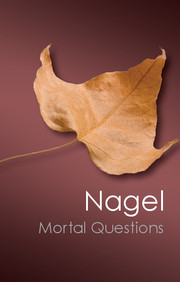Book contents
- Frontmatter
- Contents
- Preface
- Sources
- 1 Death
- 2 The Absurd
- 3 Moral Luck
- 4 Sexual Perversion
- 5 War and Massacre
- 6 Ruthlessness in Public Life
- 7 The Policy of Preference
- 8 Equality
- 9 The Fragmentation of Value
- 10 Ethics without Biology
- 11 Brain Bisection and the Unity of Consciousness
- 12 What is it like to be a bat?
- 13 Panpsychism
- 14 Subjective and Objective
- Index
- Frontmatter
- Contents
- Preface
- Sources
- 1 Death
- 2 The Absurd
- 3 Moral Luck
- 4 Sexual Perversion
- 5 War and Massacre
- 6 Ruthlessness in Public Life
- 7 The Policy of Preference
- 8 Equality
- 9 The Fragmentation of Value
- 10 Ethics without Biology
- 11 Brain Bisection and the Unity of Consciousness
- 12 What is it like to be a bat?
- 13 Panpsychism
- 14 Subjective and Objective
- Index
Summary
By panpsychism I mean the view that the basic physical constituents of the universe have mental properties, whether or not they are parts of living organisms. It appears to follow from a few simple premises, each of which is more plausible than its denial, though not perhaps more plausible than the denial of panpsychism.
Material composition
Any living organism, including a human being, is a complex material system. It consists of a huge number of particles combined in a special way. Each of us is composed of matter that had a largely inanimate history before finding its way onto our plates or those of our parents. It was once probably part of the sun, but matter from another galaxy would do as well. If it were brought to earth, and grass were grown in it, and milk from a cow that ate the grass were drunk by a pregnant woman, then her child's brain would be partly composed of that matter. Anything whatever, if broken down far enough and rearranged, could be incorporated into a living organism. No constituents besides matter are needed.
Nonreductionism
Ordinary mental states like thought, feeling, emotion, sensation, or desire are not physical properties of the organism – behavioral, physiological, or otherwise – and they are not implied by physical properties alone.
- Type
- Chapter
- Information
- Mortal Questions , pp. 181 - 195Publisher: Cambridge University PressPrint publication year: 2012
- 4
- Cited by

